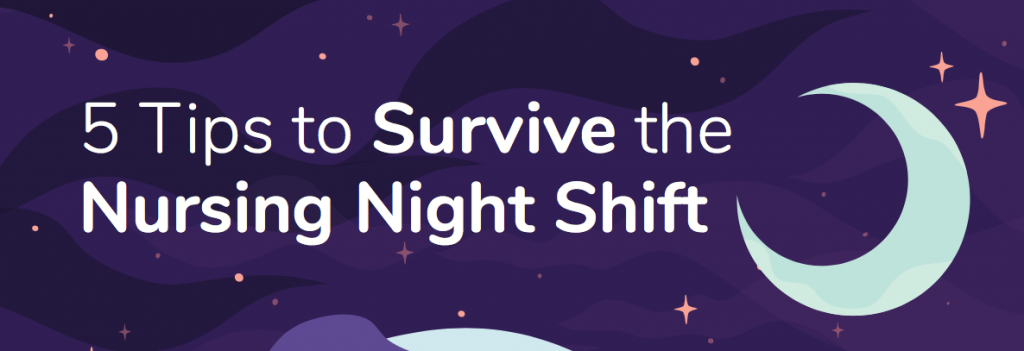As a nursing student, there’s a myriad of emotions running through your mind as you start your first night shift, sometimes referred to as the third shift. The idea of disrupting your already lack of sleep is dreadful. However, after getting through your first night shift, you’ll realize that it’s not as intimidating. About 4% of America’s workforce has the night shift (Bureau of Labor Statistics, 2018). With a small population working these odd hours, it’s no surprise that there’s a lot of unknown advantages to working the night shift. Some nurses find that it perfectly fits their daily routine and prefer to work only evenings and nights.
Typically, the night shift is from 11:00 PM to 7:00 AM, but ultimately differs depending on the health care facility. The role and responsibilities are the same as a daytime nurse although, the night shift does present a set of unique challenges. Likewise, the advantages of working the nightshift are often overlooked as well. In order to successfully work a night shift, RNs should adapt their mind and body to the new working conditions. There are several factors that can affect your performance. From sleeping to eating habits, here are a few helpful nursing tips to take on the night shift and maintain a positive mindset.
Schedule Night Shifts Consistently
The human body is hard-wired to be active in the daytime and will produce melatonin as soon as it starts to get dark outside. It’ll take some time to train your body to develop a sleep pattern custom to your routines at home and work. To minimize the amount of sleep lost, experienced nurses will schedule night shifts back to back. This helps them avoid the “night shift hangover” where a day shift can interrupt their scheduled night shifts.
Finding the best time to rest will be difficult, but you know your body best. The National Sleep Foundation encourages night shift workers to set a routine wake up and sleep time. Talk to your nurse manager to see if you can be scheduled for night shifts consistently. This will be helpful, especially if you intend on establishing a routine around them.
Spend Your Down Time With Daytime Activities
We know that working in a hospital can be chaotic and unpredictable. Regain some normalcy in your down time with hobbies that you enjoy. Working the night shift means you’re able to do things in the daytime that typical 9-5 workers can’t. If you’re completing residency in a new city, take the time to explore all that it has to offer like a city tour or biking around the town to hang with the locals. There’s a lot of extracurricular classes to join in the daytime for dancing, music, cooking, art, working out and so much more.
For parents raising children, alternating work shifts ensure that you’re both spending time with the kids. A typical 9-5 schedule often requires extra assistance from nannies or grandparents. When one spouse works 9-5 and the other works the night shift, there will be at least one parent present to care for the children. Working the night shift means you can join school activities like becoming a parent volunteer in the classroom or chaperoning the school field trip.
Napping is an Effective Method of Rest
Studies have shown that waking up close to the beginning of the shift time will help you feel more alert. Instead of coming home from a night shift and immediately going to sleep, try a sandwich technique where you nap twice a day, but stay awake for a period of time in between. Let’s say your shift is complete by 7:00 AM. Nap from 8:00 AM to 1:00 PM, then wake up to eat, exercise, run errands, and perform any home responsibilities. Around 5:00PM, take another four hour nap and wake up in time to get ready for your shift.
This sleeping pattern ensures that you still get a minimum of eight hours of rest, especially a significant amount before your 8-hour night shift. When you’re rested, you are more likely to stay alert while working. In comparison, if we take the same schedule from above, you can sleep from 8:00 AM to 4:00 PM. The 7 hours you’re awake before your 11:00 PM shift will inevitably take up a majority of your energy and cognitive abilities and accumulating 15 hours of continuous awake time far exceeds the human body’s abilities to perform consistently and efficiently.
Restore Energy With a Balanced Diet
Oftentimes, we rely on caffeine to give us that boost in energy to get through a shift. It’s a quick solution, but can have long-term effects on our body. Common health problems that develop from ingesting large amounts of caffeine include: raised blood pressure, acid reflux, heartburn, and later evolve to dependency. When ingested on an empty stomach, the side effects include: nausea, dizziness, anxiety, headaches, and more that hinders your cognitive abilities.
If you’re feeling slight fatigue during your night shift, consider packing a meal and snacks that naturally fuel your body. Simple sugars from fruits like bananas and apples will increase your glucose levels. Grains rich in fiber like brown rice and quinoa are great sources of carbs to convert into energy. Fatty foods like salmon and avocado contain healthy fats and vitamins as well. Healthy snacks like nuts, edamame, and dark chocolate are great pick-me-ups when you’re feeling a bit peckish around the 6-hour mark. Check out this comprehensive list of foods that can boost your energy.
Keep Your Mind and Body Active
While the workload may be lighter, it’s important to keep yourself engaged with your work. Frequent breaks in concentration can lead to fatigue much faster. When there’s down time, hospitals typically have a list of low-priority tasks to do that are still essential for day-to–day operations. Night shift nurses also help set up rooms and equipment to prepare for the next shift.
Non-work related activities can include exercising while on break. The cardio will help circulate blood flow and increase alertness. Additionally, while you have more time to deliver one-on-one patient care, you’ll also have the chance to get to know your nurse team. Nurse teams with good work relationships experience higher job satisfaction. Being able to freely communicate and bond with coworkers is essential for the night shift to run smoothly.
At Eisenhower Health, we maintain a five-star environment for nurses to happily advance their careers. Explore our array of part-time and full-time nurse and other health care provider positions. We are sure that you will experience a fulfilling nursing career at our world-class facility. Check out our Career page to find available nursing jobs and nursing specialties that align with your skills and interests.
Originally posted on 5/13/2021




